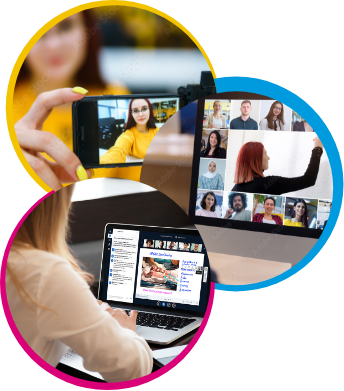When Groundhog Day is Your Worst Nightmare
by Alison Maloney
When Professor Alexandra Ludewig, Head of Humanities at The University of Western Australia (UWA), first arrived at UWA in the late 1990s, recording booths and language labs with cassette tapes marked the landscape. In those days, the term automated lectures was emerging, and Professor Ludewig jumped on board immediately, recognizing that this was a pivotal step for learning and teaching – a flexible learning environment that would allow students to access lectures wherever and whenever they wanted, learning at their own speed.
As more and more opportunities for using video in learning and teaching have emerged over the years, Professor Ludewig has integrated pre-recorded lectures, polling questions and video assignments into her teaching, saying that, “from ChatGPT to translations tools, my goal is to show learners that learning with technology is to be embraced and not feared.”
Recognizing that most students today grow up with mobile phones and the internet as integral parts of their life experience, embracing technology in education becomes crucial. Ludewig has found that her receptivity to what students bring to the table, and their ideas about improving their own learning and assessment – including their surprise at her openness to them – fosters a dynamic relationship and maintains what she considers to be the crucial human touch.
Part of that human touch is the willingness to try new things and to be willing to fail with the students, “I think it is very important to insert yourself and your own humanity, your own mistakes, your frailty, and to remember that developing new skills takes time. I think students also like to see you fail, to see that you are human, and things don’t work for you just as they don’t work for them. So not to lose that human element and that unpredictability and creativity, that comes hopefully with random choices that we make in everyday life”.
Throughout her teaching career, Ludewig has recognized that the needs of her learners have changed, and she adapts her teaching style and content, appreciating that the balance lies in staying enthusiastic without overwhelming learners and therefore ensuring that technology enhances, rather than hinders, their learning experience. She also admits that her worst nightmare is ‘groundhog day’ and enjoys the challenge of students with different expectations and the need for new content.
Encouraging learners to embrace technology and see its potential beyond the classroom is an important part of the course; an electronic portfolio that learners build over the course of their degree can help them get noticed on apps such as LinkedIn as well as in job interviews, showcasing a student’s interpersonal and technological skills. Ludewig believes that the ability to navigate challenging projects with technology provides students with a competitive advantage.
Professor Ludewig is one of the first academics across the world to truly embrace Echo360’s Echosystem. After many years using the features of EchoVideo, from lecture capture and video for flipped learning, to assessment and analytics, she sees Echo360’s video platform as an essential tool for everyday learning and teaching, and a one-stop solution for video use cases in education.
Polling and discussion have always been a crucial part of connecting with students where they are: being able to adapt to questions and feedback from students saw Ludewig add polls to her classes through EchoVideo. Since the release of EchoPoll, she has been offered even more opportunity to increase student engagement, enabling her to poll directly from an MS PowerPoint deck while learners are able to respond on their mobile devices. No matter where students are, EchoPoll has made it easy for them to participate in the engagement activities that Ludewig crafts.
The launch of EchoPoll’s AI tool that automates the creation polls in a presentation deck is an exciting addition for her, and Ludewig knows it will save her time and offer the opportunity for interactions with learners she may not have thought of.
She finds that blended and hybrid classrooms can pose challenges for academics who have to cater to diverse student needs, and careful navigation is required. Ludewig explains that we don’t always know how students access the content we share with them, or the different contexts they are in, or how they would like it adapted to improve their engagement. That said, she believes the benefits of reaching a wider audience and providing flexibility outweigh the challenges, and she enjoys the lessons from students along the way.
“The journey of integrating technology into education is one of evolution, adaptation and continuous exploration. As we celebrate the advancements, the commitment to maintaining the human touch and fostering a dynamic, student-centric learning environment remains at the forefront. Embracing technology when done thoughtfully, opens doors to endless possibilities in education.”
A final word from Professor Ludewig about her journey with Echo360.








